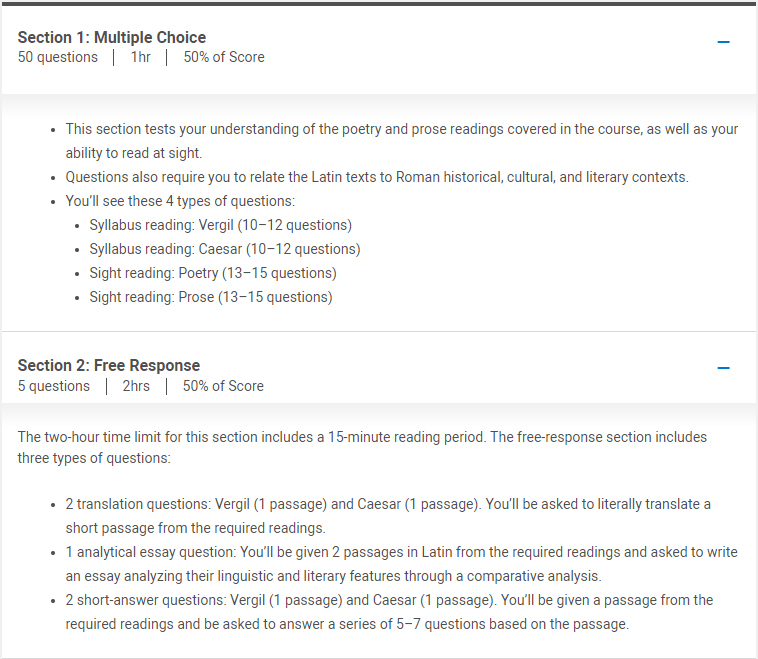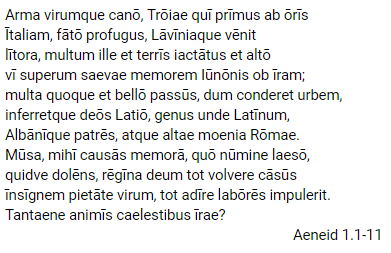AP Latin Exam Guide
5 min read•september 19, 2020
Morgan Chu
AP Latin 🏛
24 resourcesSee Units
The Ultimate AP Latin Exam Guide
A quick pep talk before we start
You've been (likely) prepping for months for this exam! 🤓 One three hour test can never measure everything you've learned from studying Latin for a full year. So please, don't let your AP scores define you!
Now that we've gotten that out of the way, let's focus a bit more on the actual exam.
Exam Logistics 🤔
The AP Latin exam (just like almost every other exam) consists of 2 sections, the first one being Multiple Choice Questions, and the second being Free Response Questions.
In Section 1, you will have 1 hour to answer 50 MCQs, whereas in Section 2, you will have 2 hours to answer 5 FRQs, including the "Long Essay Question." Each section is weighted at 50% of your exam score, so it's important to prepare for both sections! 📚

Source: The College Board's AP Latin "About the Exam."
The College Board has said that there is not a specific weighting by unit, rather that there will be a certain amount of questions from their so-called "syllabus reading," which are the sections mentioned in the syllabus 📜 , and "Sight Reading," which are the sections not covered in the syllabus.
Section 1: Multiple Choice Questions
This section mostly consists of single passages, followed by sets of questions asking about various sections of the passage, such as literary devices 📝, translations in context, and scansion.
Strategies For the Multiple Choice Section 💪
- Read the questions first before reading the passage.
- It's especially important to avoid wasting time reading the whole passage and trying to translate it before looking at the questions. Think about it this way: Keep your end goal in mind. On the exam, your end goal is to answer as many questions correctly as you can, rather than rendering a translation of every passage provided on the exam.
- Understand that you may not be able to translate the entire passsage.
- And that is absolutely alright! College Board isn't looking to see how good of a translator you are, they're looking to see how well you can pick out certain elements within a given passage.
- Make ABSOLUTELY sure that you are referring to the correct word in the text (when the question specifies.)
- If a question asks you to translate a word or words in context, make sure that you are translating the right instance of that word. It's critical to double check, especially when that word is a pronoun, like a form of "qui/quae/quod."
- For sight 👓 passages, quickly scan the passage after reading the questions to see if there are any phrases that you already know from your syllabus reading.
- Sight 👓 passages are meant to test your understanding of the full story behind the Aeneid and the De Bello Gallico. What they are NOT meant to do, however, is to see how fast you can translate. That is left to the syllabus readings, which you are expected to have read and translated throughout your time in class.
Sample MC Questions
Questions 1-5 refer to the following passage below:

- Translate vi superum (Line 4) in the context of the passage.A) Of the power of the godsB) With the power of the gods C) The power of the gods D) By the power of the gods
- What are the first four metrical feet of Line 7?A) spondee-dactyl-spondee-spondee B) dactyl-spondee-spondee-spondee C) spondee-dactyl-dactyl-spondee D) dactyl-dactyl-dactyl-spondee
- With whom is Juno angry in lines 3-5?A) Jupiter B) Aeneas C) Mars D) Ascanius
- What is the case of quo in line 8? A) Nominative B) Dative C) Ablative D) Genitive
- What is one literary device found in the first 5 lines?A) Metonymy B) Chiasmus C) Enjambment D) Tmesis
Answers (Don't peek! 👀)
- D
- A
- B
- C
- A
Section 2: Free-Response Questions
This section consists of:
- 2 translation questions (1 from Caesar and 1 from Virgil), which ask you to translate a passage as literally as possible
- 1 "Long Essay Question," which asks you to compare 2 passages from the syllabus readings and compare their literary features
- 2 "Short-Answer Questions," which ask questions similar to the MCQs, but without answer choices.
Since the Short Answer Questions are almost exactly the same as the MCQs, strategies for those also apply here.
Strategies for the Translation Questions 🤨
These can be tough. After answering 50 MCQs, the first 2 questions you're faced with on the FRQ section are these two. However, there are a few tricks to make these questions a bit less daunting.
- Don't be afraid to leave blanks.
- It's perfectly fine if you can't translate a certain word/words in a sentence. Leave a space where you think the word/words should go, and come back to it. Sometimes the rest of the sentence will offer some clues as to what those words should be.
- Don't stress about idiomatic translations.
- It's especially important, on these translation questions, to focus more on producing a translation that accurately captures the grammar and meaning of the words, rather than the idiomatic meanings of certain phrases. For example, it is totally fine to say "to hold in memory" instead of "to remember" when translating "memoria tenere."
Strategies for the Long Essay Question 🖊️
The LEQ is by far the hardest question on the exam. But don't worry! It's definitely not as hard as it looks, and it's certainly not impossible. That being said, here are some strategies to break this essay down.
- Make sure you're making connections between the passages while you're reading.
- One of the most important parts of the LEQ is to not only analyze the passages separately, but to look at the two passages together.
- You MUST use the Latin to support your point in the essay.
- During your essay, you must use Latin quotes(either direct quotes or line numbers) from both passages, and you MUST either translate or paraphrase the Latin to show that you understand what is being said in the selections you use.
Sample Free Response Questions

1. Translate the passage above as literally as possible.

2. Translate the passage above as literally as possible.
Questions 3-7 refer to the passage below.

3. Who is the subject of Line 50?
4. According to line 53, what is ONE and ONLY ONE quality of the spear after it hits the horse?
5. Translate "si fata deum" (Line 54) in the context of the passage.
6. What sort of grammatical construction is "uteroque recusso" (Line 52)?
7. Who else warns the Trojans against the horse, but is ignored by the crowd?
Answers! (Don't peek) 👀
3. Laocoon
4. It trembles/the sound reverberates throughout the horse
5. If the gods' fate OR if the fate of the gods
6. Ablative Absolute
7. Cassandra
More Long Essay Questions are available at College Board's website below!
Browse Study Guides By Unit
🔥Unit 3 – Vergil, Aeneid, Book 2
🏇Unit 4 – Caesar, Gallic War, Book 4
👑Unit 5 – Vergil, Aeneid, Book 4
☠️Unit 8 – Vergil, Aeneid, Books 6, 8, & 12
✍️Exam Skills - FRQ/MCQ
AP Latin Exam Guide
- The Ultimate AP Latin Exam Guide
- A quick pep talk before we start
- Exam Logistics 🤔
- Section 1: Multiple Choice Questions
- Strategies For the Multiple Choice Section 💪
- Sample MC Questions
- Section 2: Free-Response Questions
- Strategies for the Translation Questions 🤨
- Strategies for the Long Essay Question 🖊️
- Sample Free Response Questions
- More Long Essay Questions are available at College Board's website below!
⚔️Unit 1 – Vergil, Aeneid, Book 1
🥗Unit 2 – Caesar, Gallic War, Books 1 & 6
🥊Unit 6 – Caesar, Gallic War, Book 5, Part I
🧄Unit 7 – Caesar, Gallic War, Book 5, Part II, Book 6, & Book 7

Fiveable
Resources
© 2023 Fiveable Inc. All rights reserved.